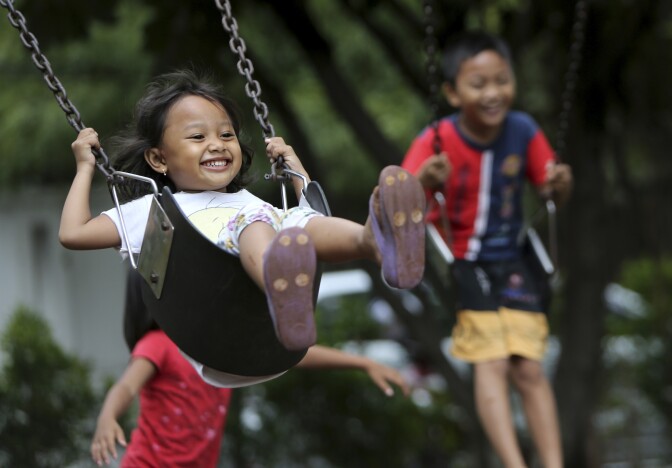This story is free to read because readers choose to support LAist. If you find value in independent local reporting, make a donation to power our newsroom today.
This archival content was originally written for and published on KPCC.org. Keep in mind that links and images may no longer work — and references may be outdated.
Those who swing together, stay together

How do you get young children to cooperate with each other? Swinging on swing sets in synchrony might help.
That's what Andrew Meltzoff, the co-director of the University of Washington Institute for Learning and Brain Sciences and an expert on infant and child development, is discovering in his latest research, which gives us insight into the kinds of things that help kids get along with each other.
Meltzoff sat down with KPCC’s Devin Browne at the Simms/Mann Institute Think Tank to explain more.
Tell me about the relationship between kids' cooperation and music.
We’re doing some new research in our lab about how children being in sync with other children helps them cooperate with others. We’re very interested in how music is important, so we decided to focus on very specific part of music — when kids play music together, they often move their body in time with each other and they engage jointly and synchronously together. So what we wanted to do was isolate the synchrony and see how important that was.
And you did this by studying kids on swing sets?
We built a swing set in our lab and took unfamiliar four year olds—who had never met each other before—and we tested them, almost 200 kids, together in pairs.
We had them swing together, so two swings moving exactly at the same time, and in the other group, we had the kids swing but they were swinging out of time with one another. And after the children experienced this, we found that the children who were swinging in synchrony were much more cooperative with one another.
And four year olds cooperating with each other—it’s not their strong suit, to have four year olds who are not familiar with each other, not friends—they often compete or work separate from each other, each do their own thing. But lo and behold, the groups that had been swinging together, when they were presented with this task, did it in a very, very cooperative way.
So it’s a little bit like, in the old days, if you remember a swing, sort of a bench swing on the porch where high school boy and girl might be dating and swinging on a bench together. That was getting them in tune or in sync and it seems to have positive—it’s called pro-social behavior, you act more socially with one another when you’ve been moving in sync.
That happens naturally when kids drum together, when they march together, when they do musical activities together. But we were able to show in this experiment that simply moving their bodies in sync improved their pro social behavior, their cooperation. So we’re very excited about this.
And we're interested in promoting pro-social behavior among young kids. It’s so important to today’s world to know how to get along with each other, cooperate with each other, act empathetically and cooperatively with one another. Many parents, policy makers and scientists are wondering what we can do to promote that.
I guess we need more diplomats from around the world to get on swing sets together?
You could do that! That’s one implication. The other educational implication is that music classes used to be prevalent in elementary schools and even preschools, and they've sometimes been squeezed out because people are interested in what are considered more academic subjects.
But there is a value in music and in kids doing joint activities like that together. And we’re beginning to think that stripping these music classes out of schools is maybe taking an important part of social, emotional development out of the schools.
And how does this impact children's ability to perform in more academic subjects, like reading and math?
It’s not too much of a stretch to think that working cooperatively with one another may lead to being able to work collaboratively with one another on academic subjects. Of course, you need the skillset—there’s absolutely no question. People need the technical skills.
But in addition to having the technical knowledge, we all know that creativity and innovation in today’s society also takes being able to work collaboratively—that means being able to get along with another, take the perspective of another, work in a cooperative way with another.
So in a very primitive, cursory way, these experiences with music or synchrony that we can do with our young children even the dinner table, in preschool and so forth, can help set them on a pathway of interacting with each other in collaborative and social ways that will change their lives and be important for their success and society’s success.







